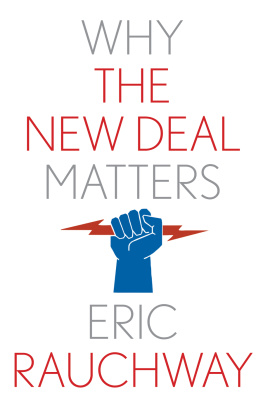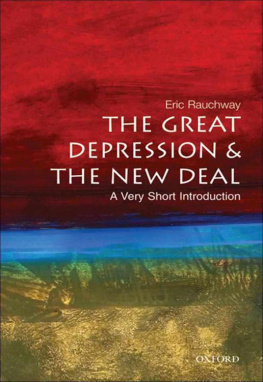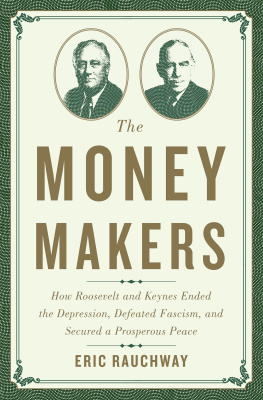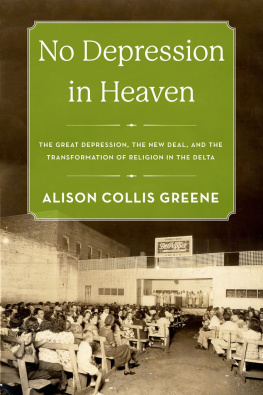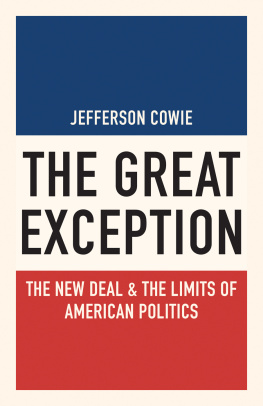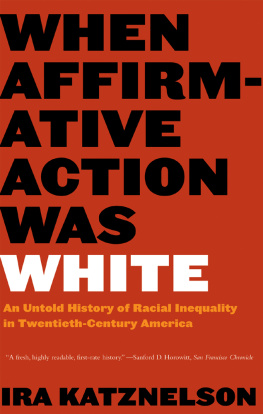why the new deal matters


Why X Matters is a registered trademark of Yale University.
Copyright 2021 by Eric Rauchway.
All rights reserved.
This book may not be reproduced, in whole or in part, including illustrations, in any form (beyond that copying permitted by Sections 107 and 108 of the U.S. Copyright Law and except by reviewers for the public press), without written permission from the publishers.
Yale University Press books may be purchased in quantity for educational, business, or promotional use. For information, please e-mail (U.K. office).
Set in Adobe Garamond type by IDS Infotech Ltd.
Printed in the United States of America.
Library of Congress Control Number: 2020945676
ISBN 978-0-300-25200-2 (hardcover : alk. paper)
A catalogue record for this book is available from the British Library.
This paper meets the requirements of ANSI/NISO Z39.48-1992 (Permanence of Paper).
10 9 8 7 6 5 4 3 2 1
also by eric rauchway
NONFICTION
Winter War: Hoover, Roosevelt, and the First Clash Over the New Deal
The Money Makers: How Roosevelt and Keynes Ended the Depression, Defeated Fascism, and Secured a Prosperous Peace
The Great Depression and the New Deal: A Very Short Introduction
Blessed Among Nations: How the World Made America
Murdering McKinley: The Making of Theodore Roosevelts America
The Refuge of Affections: Family and American Reform Politics, 19001920
FICTION
Banana Republican
For Kathy
contents
introduction
One winter in the United States there were more people out of work than at any time anyone could remember or records could tell. In the evenings, families throughout the country gathered to enjoy such entertainment as they could findand afford. Few of them had been able to go anywhere, nor did they have much news the others did not already know. Crisis had grown normal. Hard times had lasted so long, and so shrunk their horizons, that many people grew sick of their housemates and the limits of their lives, constrained by this long emergency, and by uncertainty, and by the inexorable dwindling of their resources and the apparently ineffective actions of everyone to do anything to reverse the destructive inactivity that plagued their nation, and others. Their houses smelled of the few meals they knew how to cook and for which they could get ingredients, and also of fear. For an invisible enemy lurked outside, one that had gathered strength in Asia and in Europe, and that now threatened to pour out its unreasoning malice on the United States. You couldnt see it; you didnt know which of your neighbors might harbor it. So you kept to the people you knew best, you did your work if you still had some, and you hoped that in the evening you might find distraction from the news, all of which was bad.
And then, toward the end of that winter, there was something new to hear, because American voters had made a decision about their country. Even as the unending crush of desperation grew ever worse, they decided to dispense with what they knew and try something else. They had grown tired of sleek men assuring them repeatedly that they needed only to have confidence in the fundamentals of American business and all would be well. They had been told they need not turn to the government at Washington, DC, for help, although the government at Washington, DC, was giving money to help those same sleek, reassuring men, even while it was turning guns on other, poorer people who went to the capital city to ask for aid from their representatives. So the American voters decided they wanted a different government at Washington, one that pledged itself to pull the nation together, to do its utmost to solve their problems and to fight the global contagion of fascism that threatened to engulf them. They voted for a New Deal, which they had been promised would mean federal jobs, laws protecting workers, relief for farmers, and all manner of things that the wisdom of bankers and businessmen had thus far mandated they ought not to have because recognizing these rights would fetter American ingenuity.
And so, with that decision made, and a few last weeks of winter to get through before the spring on which so many had placed their hopes, the families huddled in American homes were able to
The New Deal mattered then, at the cusp of spring in 1933, because it gave Americans permission to believe in a common purpose that was not war. Neither before nor since have Americans so rallied around an essentially peaceable form of patriotism. The results of that effort remain with us, in forms both concrete and abstract; the New Deal therefore matters still because Americans can scarcely get through a day without coming into contact with some part of it.
It matters, too, as a message for Americans from the past: democracy in the United States, flawed and compromised as it was, proved it could emerge from a severe crisis not only intact but stronger. Even at that moment, in that winter, the nation of Germany was taking a different path than the one of essential democracy. When the New Deal began, fascism was on the march around the world and its agents were working within the United States; it ended with the United States and its allies triumphant over that ideology and establishing a New Deal for the worldor at least a framework for oneand an improved democracy within the United States.
We might do well to heed that message now, taking note of our predecessors successes and failures alike as we consider how we can find our way out of a hard, strange, isolated winter of our own.
When I started writing this book, I wanted to show how easy it was to point out how much the New Deal matters to our daily lives. You dont even really need to know where to look; you just need someone to tell you what youre looking at: evidence of the New Deal is everywhere even now, nearly a hundred years since it started. I walked for ten minutes, over to the library on the campus of the University of California, Davis, where I work, and sat in the reading room there. Readers and writers always crowd the desks; it is a fine spot for us on account of its high ceilings and the good light that fills the space. I wanted to count the windows myself so I could report them to you: there are nine, each nearly two hundred feet square. There are also twenty-seven custom-designed, streamlined, aluminum chandeliers with frosted glass. Under ordinary circumstances, anyone can walk in there, sit down, and read, or write, or just enjoy the northern exposure. Surely hundreds of thousands of people have done so since the librarys completion in 1940, although its impossible to say exactly how many have come in here: this is an open-stacks library with no turnstile, a genuinely public place. It was a project of the Public Works Administration (PWA), established in 1933 as one of the earliest agencies of the New Deal created by an administration that would build libraries to save books at a time when the Nazis were burning or banning them. Eventually, the PWA published a glossy, beautifully illustrated volume of its achievements that
As I write now, you cannot visit it, nor can I, and I cannot say when either of us might again be able to: like so many of the nations shared spaces, it has been shut in the interest of public safety. To prevent the spread of the novel coronavirus that causes COVID-19, states and municipalities around the country in 2020 urged Americans to keep away from the places where we ordinarily congregate. Forced to retreat into our homes weat least for the time beingsurrendered access to our temples. Perhaps, like me, during this time you were suddenly able to feel keenly how precious these public things were, having lost them even momentarily. Parks, libraries, gardens, swimming pools, sidewalks, airports, seaports, schools, stadiumsall these things, suddenly shut, constituted the public sphere that Americans built for themselves under the New Deal.
Next page
